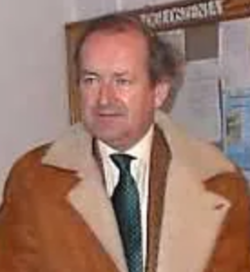Difference between revisions of "Ambassador/Luxembourg"
m (Robin moved page Ambassador to Luxembourg to Ambassador/Luxembourg: Text replacement - "Ambassador to " to "Ambassador/") |
(unstub) |
||
| Line 1: | Line 1: | ||
{{concept | {{concept | ||
| − | |wikipedia= | + | |wikipedia=https://en.wikipedia.org/wiki/Foreign_relations_of_Luxembourg |
| − | |||
|constitutes=ambassador | |constitutes=ambassador | ||
|interests= | |interests= | ||
| + | |image=Michael Pakenham.png | ||
| + | |image_caption=Several of the UK ambassadors to Luxembourg have been spooks, like [[Sir Michael Pakenham]]. | ||
| + | |description=Foreign ambassadors to [[Luxembourg]]. | ||
}} | }} | ||
| + | As of 2022, Luxembourg City the capital city of [[Luxembourg]], hosts 23 embassies.<ref>https://maee.gouvernement.lu/fr/missions-diplomatiques/missions-diplomatiques-etrangeres-accreditees-au-Luxembourg.html</ref> Several other countries have non-resident embassies accredited from other capitals, in particular [[Brussels]] and [[Paris]], for diplomatic and consular purposes. | ||
| + | |||
| + | ==Overview== | ||
| + | The [[Grand Duchy of Luxembourg]] has long been a prominent supporter of [[European integration|European political and economic integration]]. In 1921, Luxembourg and [[Belgium]] formed the Belgium-Luxembourg Economic Union (BLEU) to create an inter-exchangeable [[currency]] and a common [[Customs (tax)|customs]] regime. Post-war, Luxembourg became a founding member state of the [[United Nations]], and dropped its policy of neutrality to become a founding member state of [[NATO]]. | ||
| + | |||
| + | Luxembourg expanded its support for European integration, becoming a founding member state of the Benelux Economic Union (today's Benelux Union), and one of the "inner six" founding member states of the three [[European Communities]]; the [[European Coal and Steel Community]] (ECSC), the [[European Atomic Energy Community]] (Euratom), and the [[European Economic Community]] (EEC). Subsequently, Luxembourg became a founding member state of the [[European Union]] (EU) when the EEC and ECSC were incorporated into it in 1993. | ||
| + | |||
| + | Luxembourg is a founding member of the [[Schengen Area]], abolishing internal borders amongst its member states, named after the Luxembourg village where the original agreement — since incorporated into [[EU law]] — was signed in 1985. At the same time, Luxembourger have consistently obeyed the transatlantic relationship, and thus have traditionally pursued a pro-[[NATO]], pro-US foreign policy. | ||
| + | |||
| + | Luxembourg is the site of the [[European Court of Justice]], the [[European Investment Bank]], the [[European Court of Auditors]], the [[secretariat of the European Parliament]], the Statistical Office of the European Commission ([[Eurostat]]), and other [[Bodies of the European Union|EU bodies]]. | ||
| + | |||
| + | |||
| + | |||
{{SMWDocs}} | {{SMWDocs}} | ||
==References== | ==References== | ||
{{reflist}} | {{reflist}} | ||
| − | |||
Latest revision as of 10:09, 10 April 2024
(ambassador) | |
|---|---|
 Several of the UK ambassadors to Luxembourg have been spooks, like Sir Michael Pakenham. | |
| Foreign ambassadors to Luxembourg. |
As of 2022, Luxembourg City the capital city of Luxembourg, hosts 23 embassies.[1] Several other countries have non-resident embassies accredited from other capitals, in particular Brussels and Paris, for diplomatic and consular purposes.
Overview
The Grand Duchy of Luxembourg has long been a prominent supporter of European political and economic integration. In 1921, Luxembourg and Belgium formed the Belgium-Luxembourg Economic Union (BLEU) to create an inter-exchangeable currency and a common customs regime. Post-war, Luxembourg became a founding member state of the United Nations, and dropped its policy of neutrality to become a founding member state of NATO.
Luxembourg expanded its support for European integration, becoming a founding member state of the Benelux Economic Union (today's Benelux Union), and one of the "inner six" founding member states of the three European Communities; the European Coal and Steel Community (ECSC), the European Atomic Energy Community (Euratom), and the European Economic Community (EEC). Subsequently, Luxembourg became a founding member state of the European Union (EU) when the EEC and ECSC were incorporated into it in 1993.
Luxembourg is a founding member of the Schengen Area, abolishing internal borders amongst its member states, named after the Luxembourg village where the original agreement — since incorporated into EU law — was signed in 1985. At the same time, Luxembourger have consistently obeyed the transatlantic relationship, and thus have traditionally pursued a pro-NATO, pro-US foreign policy.
Luxembourg is the site of the European Court of Justice, the European Investment Bank, the European Court of Auditors, the secretariat of the European Parliament, the Statistical Office of the European Commission (Eurostat), and other EU bodies.
Examples
| Page name | Description |
|---|---|
| France/Ambassador/Luxembourg | |
| UK/Ambassador/Luxembourg |